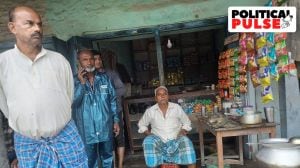Tea with a Targeted Man
The foreign office in Colombo confirmed that I was the last journalist in the world to have interviewed Sri Lankan foreign minister, Lakshma...

The foreign office in Colombo confirmed that I was the last journalist in the world to have interviewed Sri Lankan foreign minister, Lakshman Kadirgamar at his official residence, two weeks before he was shot dead. I had made the realization myself, the evening of his assassination, and raced for my notebook to find two prophecies: one hopeful, the other eerie.
For a change, the frozen Sri Lankan peace process was not on my mind when I had arrived in Sri Lanka to research a story. I wasn’t looking for dreary officialese but for someone who would shoot straight from the hip: on an old, white-washed verandah and in the dulcet tones that make Sri Lankans uniquely different from the rough speak of my native northern India. Whatever their ideological colour, I knew that highly-literate Sri Lanka abounded in that genre of public speaker.
At the media office, I brazenly bid for the biggest: Sri Lanka’s foreign minister Lakshman Kadirgamar, at any time and venue of his choosing in the coming days, please ? Five minutes later in my hotel room, my message light was flashing. Would I go to Mr. Kadirgamar’s official residence for a cup of tea at five p.m.?
Given his rapid-fire, oratorical excellence which often left the glibbest journalistic tongues in a twist, I knew that Mr. Kadirgamar would peck misinformed questions instantly to shreds. I sharpened several pencils to a point and read up like crazy.
A compelling combination of intellectual brilliance and classic Tamil aquilinity, Mr. Kadirgamar helped shape, and then towered over the diminutive country’s gigantically volatile politics.
The drive past a vast swathe of green led to Wijerama Mawatha, a leafy avenue exuding power: this is where the influential lived in scrupulously well-guarded houses. I had expected watchtowers and layers of security as I crossed the road, wondering idly, as I’ve done a million times in similar situations, which gun would go off if I bent over to tie my shoelace. But for a man highest on the hit-list of the Tamil Tigers, there was nothing extraordinary about the checks at the gate. A small reception, an entry in a book, a metal detector, a body search and a receipt for your mobile phone.
On a grand, old verandah, a tea party was in progress. Mr. Kadirgamar sprawled on a sofa, and waved me down on to another. Across sat his wife and next to her, a small freckle-faced, British boy in baggy shorts, swinging his legs and munching a cream cake. This was a kid who had been doodling on a beach south of Colombo on December 26 when the giant wave separated him from his parents. Miraculously, he was safe and so were they. Six months later, he’d just visited the beach he had been on and was now at high tea with the Kadirgamars. A hovering photographer suggested to me that the little boy’s visit was a PR exercise, organized by the Sri Lankan government.
But I’d been devastated by what I saw during those first tsunami days along Sri Lanka’s coast and the blow the wall of water dealt to the first successful tourist season after two decades of civil war. I had no journalistic cynicism to offer.
‘‘Do you know,’’ said Mr. Kadirgamar, turning to me with grandfatherly delight,’’ that this child went back to the spot where he’d been doodling, began a sand castle, and found the very same colouring book that the wave had swept out of his hands?’’ The story intrigued me and the kid’s easy interaction with the Kadirgamars as they posed for photographs was cute to watch, but I was waiting.
We went into his study soon and a senior aide joined us. Apart from the occasional questioning nod at the senior diplomat, Kadirgamar sizzled on his own. ‘‘Somewhat specious argument,’’ he muttered, as I fumbled over a question and he — expectedly — swatted me down. My scribbling hands ached and I began to see why this fluent orator attracted so many admirers and haters. He both decimated and vindicated arguments but always with wry, indulgent humour.
My story itself had little to do with the tsunami and less so with the stalled peace process in Sri Lanka, so I will bury Mr. Kadirgamar with the posthumous anonymity I had promised on that subject.
Through the conversation, his favorite tangent remained the troubled north. He said nothing he had not said in public already, but with tragically uncanny timing. The ceasefire had held for 3 years despite all else, he said, but agreed when I argued that it was tenuous. After the assassins had got him, his reply leapt out of my pages, eerily, in my own handwriting.
‘‘If the ceasefire — no matter how tenuous — holds, the Tigers will tire of ‘war preparedness’ and negotiate,’’ he insisted, as the beads of my peach squash dribbled over the polished table and I scribbled at top speed. ‘‘But — all it will take is the killing of one important person, and it’s back to war.’’
Mr. Kadirgamar, Sri Lanka is holding on admirably to the ceasefire. But there’s a spectre of grief-tinged wrath hanging over your country right now. For all your vision : I hope, for once, you were wrong.
The writer is South Asia bureau chief for the German news magazine, Der Spiegel



- 01
- 02
- 03
- 04
- 05




























